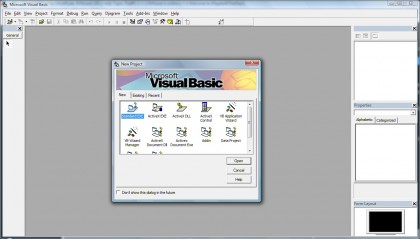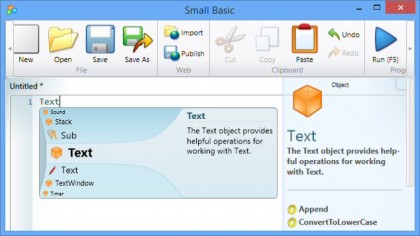Back to BASICs: the king of computer code at 50
The simple programming language that changed the world
With its attention focused on MS-DOS, Microsoft were slow to see the problems with BASIC, and that a core language devised in 1964 just wasn't up to the challenges of 80's computing.
This started to change in 1985, with the first release of QuickBASIC. The new product extended GW-BASIC with more graphics support, better structuring, and - at last - a compiler. Developers could now produce EXE files, greatly improving performance.
The real breakthrough came in 1991, though, with the first release of Visual BASIC (VB). The old text-based approach had finally disappeared, and users could instead create Windows GUIs just by dragging and dropping objects onto a "form", setting their properties, and writing code for them.

This was a revolution for most BASIC programmers. They didn't have to create their own custom GUI any more, as VB would do it for them. Extensions to the language, access to the Windows API and a range of custom add-ons and extensions made the language more powerful than ever before.
VB was a massive success, even in the professional programming world (Visual Basic experience became a genuinely marketable skill), but it still had issues. In particular, the language made it difficult to use more advanced Windows features (multi-threading, for instance), and a lack of support for object-oriented programming meant that many still didn't take it seriously.
Microsoft hadn't yet finished, however, and its final move came in 2001, with the release of Visual Basic.NET. This caused some resentment by changing many language constructs, dropping others entirely, and overall becoming much more difficult to learn. But a new object-oriented approach and easy access to .NET libraries meant that Visual Basic was finally competitive with other languages, and it's still available today as a part of Microsoft's Visual Studio.
Where next?
BASIC had an amazing influence in its early years, and played a key part in bringing easy, affordable home computing to the masses.
Are you a pro? Subscribe to our newsletter
Sign up to the TechRadar Pro newsletter to get all the top news, opinion, features and guidance your business needs to succeed!
It couldn't maintain that level of success, of course, and that's really no surprise. The problem that BASIC was designed to solve - the need to bring simpler programming tools to the masses - just doesn't exist any more.

This isn't the end of the story, though. BASIC is still a great language for developing all kinds of software. Malwarebytes Anti-Malware, HiJackThis, PDFCreator, photo editor PhotoDemon and business CRM Vtiger are all popular and very capable programs - but they were all created in VB6. It may be 16 years old, but it's still influential, even today.
You're just a beginner Microsoft has tried to recapture the original spirit of the language with Small Basic. Aimed at children, it's very simple - with only 14 keywords - yet can still be used to, say, build a Tetris game, or download and display an up-to-date weather map.
If you're nostalgic for some early flavour of BASIC, there's a good chance it's available somewhere. There are multiple BBC BASIC versions, a GW-BASIC emulator, an extended Sinclair BASIC, a 64-bit QBasic, the QuickBASIC-like FreeBASIC, even a TinyBASIC for the Raspberry Pi.
Or, if you need something more professional, the free Visual Studio Express provides all the tools you need to build everything from a simple desktop program to a shiny new Windows Store App for Windows 8.1.
BASIC has had more than its share of criticism. But even after 50 years it's still here, with something to offer everyone - and it's not going away any time soon.

Mike is a lead security reviewer at Future, where he stress-tests VPNs, antivirus and more to find out which services are sure to keep you safe, and which are best avoided. Mike began his career as a lead software developer in the engineering world, where his creations were used by big-name companies from Rolls Royce to British Nuclear Fuels and British Aerospace. The early PC viruses caught Mike's attention, and he developed an interest in analyzing malware, and learning the low-level technical details of how Windows and network security work under the hood.